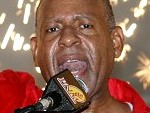By Dr. Kwame Nantambu
January 20, 2009
Updated: January 21, 2009
 For the past five hundred years, the world has been under the sway of what Dr. Ivan Van Sertima has called the “five hundred year curtain.”
For the past five hundred years, the world has been under the sway of what Dr. Ivan Van Sertima has called the “five hundred year curtain.”
This European foreign policy curtain has manifested itself in the 1655 Britain’s global master-plan/code-word under the rubric of the “Great Western Design” as enunciated by Oliver Cromwell.
Continue reading Geo-political aspects of Obama’s presidency

 THERE was a time when the moment things turned sour in this country, those who could afford it would simply flee to the USA, Canada or Europe. That happened mainly among professionals who were educated here at taxpayers’ expense, entrepreneurs who rose from running one-door shops to the multi-million-dollar enterprises. The one aberration to this pattern occurred in the late 1980s, when thousands of ordinary people, mainly Indians, fled to Canada as refugees, claiming they were oppressed by an African-dominated state machinery.
THERE was a time when the moment things turned sour in this country, those who could afford it would simply flee to the USA, Canada or Europe. That happened mainly among professionals who were educated here at taxpayers’ expense, entrepreneurs who rose from running one-door shops to the multi-million-dollar enterprises. The one aberration to this pattern occurred in the late 1980s, when thousands of ordinary people, mainly Indians, fled to Canada as refugees, claiming they were oppressed by an African-dominated state machinery. THE Draft Constitution laid by Prime Minister Patrick Manning at last Friday’s re-opening of the House of Representatives not only alters the mechanics of the Constitution but undermines the most universal tenets of constitutional accountability.
THE Draft Constitution laid by Prime Minister Patrick Manning at last Friday’s re-opening of the House of Representatives not only alters the mechanics of the Constitution but undermines the most universal tenets of constitutional accountability. On 1st January 1959, a successful armed revolution took place in the Caribbean. This revolution destroyed Euro-Spanish-American colonial oppression in Cuba. It was led by Fidel Castro, Raul Castro and Ernesto “Che” Guevara. The Euro-Spanish-American dictatorship regime was led by Fulgencio Batista.
On 1st January 1959, a successful armed revolution took place in the Caribbean. This revolution destroyed Euro-Spanish-American colonial oppression in Cuba. It was led by Fidel Castro, Raul Castro and Ernesto “Che” Guevara. The Euro-Spanish-American dictatorship regime was led by Fulgencio Batista. 

